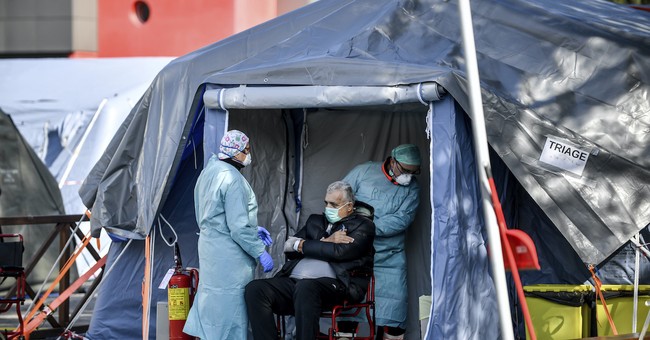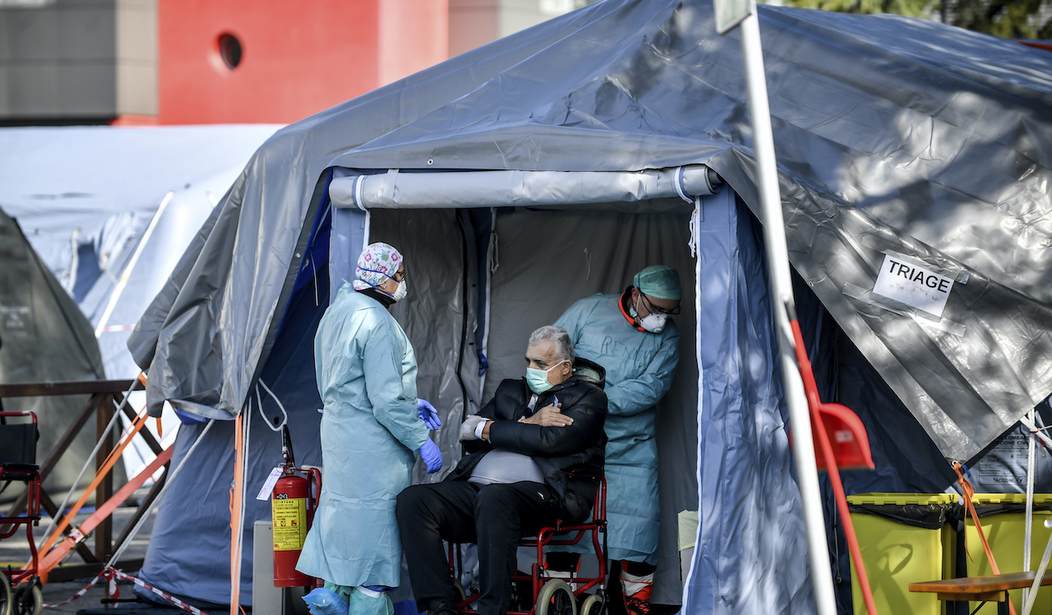
An elderly patient is attended in one of the emergency structures that were set up to ease procedures outside the hospital of Brescia, Northern Italy, Tuesday, March 10, 2020. For most people, the new coronavirus causes only mild or moderate symptoms, such as fever and cough. For some, especially older adults and people with existing health problems, it can cause more severe illness, including pneumonia. (Claudio Furlan/LaPresse via AP)
At the moment, most people are a bit shut in in order to avoid potential exposure to coronavirus infection.
But that’s not at all true of people in a few lines of work, and one of them is nursing.
Now more than usual, the country needs its medical care providers to report to work — that would be, an environment that’s the riskiest of all.
So how are such personnel coping?
As observed by USA Today, rather than avoiding the workplace, some hospital and doctor office staff are having to evade a very different place than most: home.
Case in point: ICU nurse Jason Odhner.
USAT reports:
It was barely 2 p.m., and already [Jason] was dreading the next morning.
He had one more night with his wife. One more night with their newborn son. An early-morning shift in a hospital ICU, standing on the front lines of a pandemic. Then he’d drive toward home. But he wouldn’t stop there. Instead he’d return to another house, right across the alley. He’d strip off his scrubs and step into a strange new existence. One that had no end in sight.
Now he stood in his new bedroom, surrounded by empty walls. He thought of his wife, sound asleep at home.
Jason’s had a bit of experience with contagious disease: He worked through the West African Ebola epidemic.
The 43-year-old knows he’ll likely be exposed to COVID-19, which has killed medical staff in Italy and China.
He can’t risk infecting his baby or family, including his wife’s elderly parents.
Therefore, he’s temporarily sharing a small home with another nurse, 32-year-old Lydia Corriveau.
Unable to continue living with her 8-months-pregnant sister, Lydia’s adjusting to the challenging circumstances:
“The problem with global pandemics is they don’t work on anybody’s schedule.”
Normally a cancer nurse, she’ll soon be working in the ICU as well.
How long will they have to do this? She doesn’t know:
“I’m not thinking long-term or short-term.”
And how’d the two meet? Lydia volunteered at a nonprofit clinic co-founded by Jason.
Currently, as noted by USA Today, they have “enough canned beans to last a few weeks and an agreed-upon set of house rules, based on [his] experience working in the…Ebola epidemic.”
Here’s their system:
After each shift at the hospital, it’s immediately into the changing room (formerly the laundry room) to remove scrubs and put on house clothes, then straight into the shower. Dirty hospital garb is placed into a sealable container.
The pair have vowed to keep surfaces wiped down, take their temperature daily, and keep results posted to a whiteboard.
And if either of them comes down with virus, one will care for the other.
Jason created a Facebook group called #FrontlineHouses and posted their rules.
After only three days, it boasted 50 members.
Some have written of their need of housing, while others have posted boarding opportunities.
As relayed by USA Today, Jason and Lydia are making it work:
Odhner and Corriveau figured it out on the fly. As they unpacked, they tried to make the strange house feel like home. Corriveau stuffed workout gear into one corner of the bedroom, and stood a banjo in the other. Odhner showed her the bidet in their bathroom. They hung art in the kitchen, art in the front room, art by the door. Corriveau opened a wide plastic tote, filled with her collection: A bright print of cactus flowers. A wood-framed reminder: You are exactly where you are supposed to be.
Nonetheless, Jason’s missing his baby. And a pandemic could last months. Even a year:
“I’m not going to touch him. But I can see him.”
Speaking personally, I have a friend who’s in the same situation. She’s had to leave the house she shares with a family and three small children and find alternative lodging.
Therefore, her life toggles between hectic shifts at the hospital and isolation in a place that isn’t home.
In my view, it’s worth noting the especially wonderful services our doctors and hospital staff provide in such a time as this. And the sacrifices they make all the while.
We often speak of the heroism of First Responders, and we absolutely should. But it’s also good to remember that, in our current state of crisis, thousands upon thousands of other men and women across the country are serving as brave soldiers in the fight against disease.
They risk their lives — and, in some cases, they give up their homes and loved ones — in order to save ours.
To any of you reading who serve us thusly, thank you so much.
-ALEX
Find all my RedState work here.
And please follow Alex Parker on Twitter and Facebook.
Thank you for reading! Please sound off in the Comments section below. For iPhone instructions, see the bottom of this page.













Join the conversation as a VIP Member